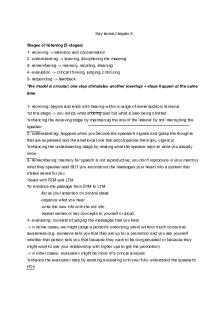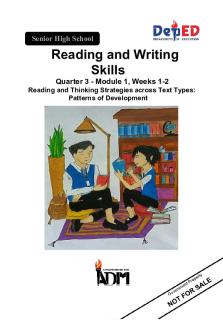3. Chapter 1 - Writing Analytically. pdf PDF

| Title | 3. Chapter 1 - Writing Analytically. pdf |
|---|---|
| Author | Daniel Bron |
| Course | Eng Composition Ii |
| Institution | University of Miami |
| Pages | 2 |
| File Size | 110.6 KB |
| File Type | |
| Total Downloads | 37 |
| Total Views | 146 |
Summary
Chapter 1 of writing analytically for class ENG 106 with various highlighting and notes...
Description
CHAPTER1 The Five Analytical Moves Overview In this chapter, we define analysis and explain why it is the kind of writing you will most often be asked to do in college and beyond. We explain the characteristics that college teachers look for in student writing and the changes in orientation this kind of writing requires: the analytical frame of mind. The chapter identifies the counterproductive habits of mind most likely to block good writing and offers in their place the book's first set of strategies for becoming a more observant and more confident writer: NoTICE & Focus, free writing, AsKJNG "So WHAT?," and THE METHOD. These strategies are embedded in a discussion of what we call the Five Analytical Moves.
Writing as a Tool of Thought Of all the skills you acquire as a writer and thinker, analysis is likely to have the greatest impact on the way you learn. This is so because the more that you write analytically, the more actively and patiently you will think. The patience comes from recognizing that ideas and understanding are a product not just of sudden flashes of insight but of specific mental skills. Thinking is a process, an activity. Ideas don't just happen; they are made. This book will make you much more aware of your own acts of thinking and will show you how to experiment more deliberately with ways of arriving at ideas-for example, by sampling kinds of informal and exploratory writing that will enhance your ability to learn. As the next few chapters will show, the analytical process consists of a fairly limited set of basic moves. People who think well have these moves at their disposal, whether they are aware of using them or not. Writing Analytically describes and gives names to these moves, which are activities you can practice and use systematically in order to become a more confident, more resourceful, and more independent thinker and writer. Learning to write well means more than learning to organize information in appropriate forms and to construct clear and correct sentences. Learning to write well means learning ways of using writing in order to think well. This means that writing can make you smarter. But first, you have to learn to feel comfortable with the activity. Since so much writing instruction concentrates on what writers do wrong, it is difficult for many people to find the necessary
2
UNIT 1 The Analytical Frame of Mind
level of comfort and trust to make writing happen. Clearly, rulei matters of form are important, and we will have much to say abc the third part of this book, but rules governing such things as papt tion and style don't easily translate into the ability to get words or: in the first place--the stage of writing that classical rhetoric called ' In classical rhetoric, procedures and forms that served as aid ery were called "heuristics." The term comes from the Greek wore which means "to find out" or "to discover." This book's analyticc such as the ones you will find in this chapter, are heuristics. '. alternatives to what might be called the light bu.lb theory of i wherein ideas simply come to people, like a light bulb turning heads. Writers do, of course, sometimes have ideas in this way and una-pectedly and seemingly with little conscious effort: Bu:t, to show, this is more often the exception than the rule.
Why Faculty Want Analysis
For over two decades, we've co-directed a Writing Across the Curri gram in which writing is taught by our colleagues from all the other They have helped us to see why analysis is what they expect frc writing. They want analysis because of the attitudes toward le, come along with it-the way it teaches learners to cultivate curiosi ate uncertainty, to respect complexity, and to seek to understan before they attempt to make arguments about it. Overall, what faculty want is for stt:.dents to learn to do t: course material beyond merely reporting :t on the one hand, and ing to it {often through like-dislike, agreedisagree responses) or (see Figure 1.1). This is the issue that Writing Analytically addresE locate a middle ground between passive summary and persona: That middle ground is occupied by analysis. HAVING IDEAS (doing something with the material) versus R E T ELATING-+-----------------------� R POR IN (personal experience (informati, matters, but ... ) matters, but
FIGURE 1.1
What Faculty Want from Student Writing
Analysis Is a Search for Meaning To analyze something is to ask what that something means. I how something does what it does or why it is as it is. Analysis ii detective work. It typically pursues something puzzling, somethi CHAPTER 1 The Five Analytical Mo•...
Similar Free PDFs

Writing Analytically - Ch7
- 4 Pages

writing Assignment 3 - Chapter 7
- 2 Pages

Summary Writing Examples Pdf
- 4 Pages

Letter-Writing-PDF - Lecture notes 1
- 13 Pages

Writing 3
- 1 Pages

267778769 Chapter 1 pdf
- 38 Pages

1-3 Writing Plan Prgress Check 1
- 3 Pages

Key terms chapter 3 pdf
- 5 Pages

Bitacora PDF - Grade: 1, 3
- 4 Pages
Popular Institutions
- Tinajero National High School - Annex
- Politeknik Caltex Riau
- Yokohama City University
- SGT University
- University of Al-Qadisiyah
- Divine Word College of Vigan
- Techniek College Rotterdam
- Universidade de Santiago
- Universiti Teknologi MARA Cawangan Johor Kampus Pasir Gudang
- Poltekkes Kemenkes Yogyakarta
- Baguio City National High School
- Colegio san marcos
- preparatoria uno
- Centro de Bachillerato Tecnológico Industrial y de Servicios No. 107
- Dalian Maritime University
- Quang Trung Secondary School
- Colegio Tecnológico en Informática
- Corporación Regional de Educación Superior
- Grupo CEDVA
- Dar Al Uloom University
- Centro de Estudios Preuniversitarios de la Universidad Nacional de Ingeniería
- 上智大学
- Aakash International School, Nuna Majara
- San Felipe Neri Catholic School
- Kang Chiao International School - New Taipei City
- Misamis Occidental National High School
- Institución Educativa Escuela Normal Juan Ladrilleros
- Kolehiyo ng Pantukan
- Batanes State College
- Instituto Continental
- Sekolah Menengah Kejuruan Kesehatan Kaltara (Tarakan)
- Colegio de La Inmaculada Concepcion - Cebu






